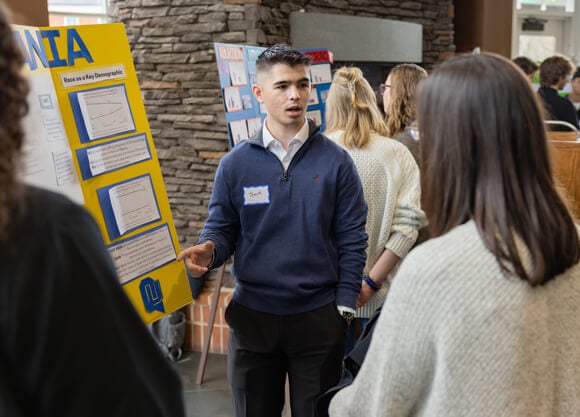
Quinnipiac Poll Signature Experience offers students valuable perspectives, insights
December 10, 2024

December 10, 2024

With facts supported by data, analysis, research and the gold standard methodology of the Quinnipiac University Polling Institute, students in the Quinnipiac Poll Signature Experience class learned that while Trump won the Electoral College handily, the popular vote margin — as it had reliably polled for months — was razor thin.
Just how thin? Imagine a strand of hair under a microscope.
On Friday, these students shared their interdisciplinary research findings during the Quinnipiac Poll Signature Experience Poster Session in a jam-packed Piazza among a sea of tri-fold boards, graphs, charts, copy blocks and photos.
For Yealie Ulaba-Samura '25, a psychology and political science double major, the popular vote validated her longitudinal findings with a group that studied, "How the Quinnipiac Poll Performed in the 2024 Presidential Election." The Electoral College vote, which Trump won, 312-226, was also reflected in her analysis.
“I focused on the polls nationally. The Quinnipiac Poll did very well when you compare it to everyone else,” she said. “When you look at the numbers, and then you compare it to AP VoteCast and NBC News and everyone else, Quinnipiac is right there. They’re neck and neck. Everything was just so close. When you look at the popular vote, they’re right there.”
On December 6, after weeks of counting and recounting, The Associated Press reported that Trump collected 49.9% of the popular vote, while Kamala Harris amassed 48.4% — a difference of 1.5%, the second-closest popular-vote margin since 1968.
One group did a research project entitled, "Donald J. Trump's Level of Care for the American People by Gender & Race." Students found that minority groups of both genders have a negative opinion regarding Trump’s care for average Americans. Specifically, female voters had a more negative opinion of Trump in both 2020 and 2024.
White respondents, particularly males, show the highest percentage of positive responses from both 2020 and 2024, the students learned.
“What I did find super interesting that I took away from this was the split in gender as well as race,” said Tiffany Soriano '26, MBA '27, a marketing major. “Females and males, no matter their identity, they do face different disparities and concerns when it comes to political views, so I feel as we really looked into the race — but also compared the gender — it gave us a really detailed insight.”
Vincent “Mack” Alvino '26, a media studies major, examined the influence and impact of journalism on the 2024 election along with Ulaba-Samura and others.
“Headlines are what people are looking at. How are they influencing people? I have to think about how each of these publications is a business,” Alvino said. “They have something to sell. Negativity sells more than positivity. They’re almost going to paint polling, the practice of it, in this negative light.”
For Amanda Geraci '26, a media studies major, the takeaway was that polling marks a moment in time, not a final outcome.
“Even if there were small discrepancies in the numbers, the overall trends are the same. I think that’s what we really need to focus on,” she said. “It’s really a snapshot. It’s not a prediction, so things are subject to change. I think everyone considers it a forecast of what’s going to happen, but people’s minds change. They can change their minds right before they vote.”
These statistics — and the educational value of combining political science, marketing, media studies, data literacy, polling and journalism — were not lost on Provost Deborah Liebowitz, who created the Quinnipiac Poll Signature Experience when she arrived at Quinnipiac in July 2020.
“We had to figure out a way to connect the academic experience with the Quinnipiac Poll, which is just an amazing resource that we have here,” said Liebowitz, a self-described political scientist by training.
“One of the best polls in the country — in the world — gives you the chance to look at and investigate all these great questions,” Liebowitz told the students. “I'll just say a big thank you right now to the faculty who have shepherded you through the process.”
Lisa Burns, professor of media studies, Scott McLean, professor of political science, and Tilottama Ghosh Chowdhury, professor of marketing, launched the Quinnipiac Poll Signature Experience with Liebowitz in 2022.
Doug Schwartz, associate vice president of the Quinnipiac University Polling Institute and director of the Quinnipiac Poll, has also been integral to this initiative.
“And a big thank you to Doug and his team for bringing the resources at the poll to help our students apply what they're learning in class,” Liebowitz said. “Congratulations to all of you for doing the work that you've done in this process.”
Schwartz, who has spent three decades at Quinnipiac, pointed out this was the first time the Quinnipiac Poll Signature Experience class included a presidential election.
“As polling director, I’m very proud of the work you do, and I’m glad we’re able to share all the facets of the poll with you, from the statistical side to the editorial content on how it’s used,” said Schwartz, who thanked Mark Bouchard, associate director of survey operation, for his role.
“For all the students here today, I'm excited for you. You had a front-row seat into a look at the role that public opinion polls played in an extraordinary presidential race with so many unexpected events.”
Quinnipiac Today is your source for what's happening throughout #BobcatNation. Sign up for our weekly email newsletter to be among the first to know about news, events and members of our Bobcat family who are making a positive difference in our world.
Sign Up Now